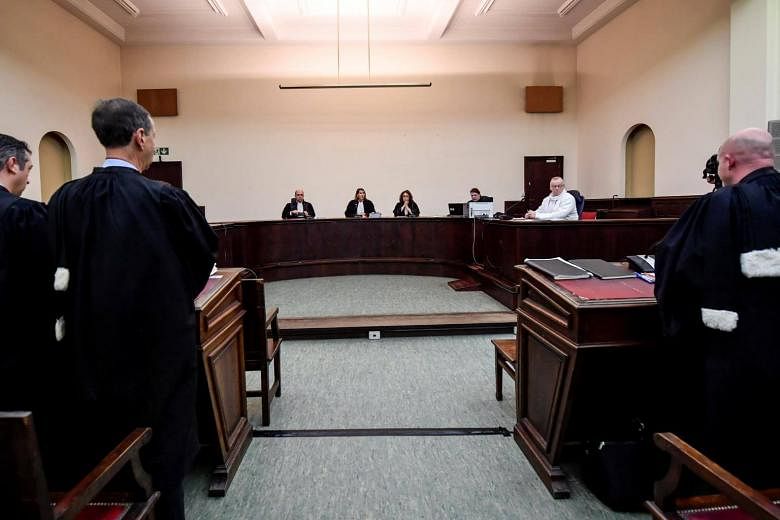BRUSSELS (AFP, REUTERS) - Paris attacks suspect Salah Abdeslam told a Belgian court on the first day of his trial over a shootout with police Monday (Feb 5) that he was not scared and put his "trust in Allah".
Abdeslam made the outburst as he told judges at the court in Brussels that he would refuse to answer any questions about the gunfight that led to his capture in 2016.
"Judge me, do what you want with me, it's in my Lord that I place my trust," said Abdeslam, who has grown long hair and a beard while in jail in France. "I am not afraid of you, I am not afraid of your allies. I put my trust in Allah and that's all, I have nothing else to add," Abdeslam told the court.
The 28-year-old Belgian-born French national also explained why he was refusing to cooperate with the court despite having asked to attend the trial.
"My silence does not make me a criminal, it's my defence," Abdeslam said. He urged the judges to consider "scientific and tangible proof" while deciding on his case, saying that otherwise they would "give up their function to the media".
"Muslims are judged and treated in the worst of ways, mercilessly. There is no presumption of innocence," he added. "I declare that there is no god but Allah, Mohammed is his his servant and his messenger."
The prime surviving suspect in the 2015 Islamic State in Iraq and Syria (ISIS) attacks on Paris is accused of the attempted murder of police shortly before his arrest in Belgium two years ago.
Monday marked his first public appearance since the attacks that killed 130 people in Paris in November 2015.
Kept under 24-hour suicide watch near Paris, the 28-year-old had been transferred to a high-security prison close to France's northern border so that he could be ferried to the Belgian capital's Palace of Justice daily.
Hearings are scheduled to last all week in a case related to events four months after the Paris attacks of November 2015.
Abdeslam was being tried along with alleged accomplice Sofien Ayari, a 24-year-old Tunisian.
Both men face up to 40 years in prison for attempted murder linked to terrorism for shooting at Belgian and French police who raided a suspected hideout in the southern Brussels borough of Forest on March 15, 2016.
Prosecutors say Abdeslam and Ayari slipped away, leaving a third gunman holding out until he was killed by police marksmen.
Lawyers for Abdeslam, a French citizen born to and raised by Moroccan immigrant parents in Brussels, admit he was in Paris on Friday, Nov 13, when gunmen and suicide bombers killed 130 at a rock concert, near the national stadium and outside cafes.
His elder brother, with whom he ran a bar in Brussels, was among those who blew himself up.
Prosecutors believe the younger Abdeslam, whom they accuse of running logistics for the attack including ferrying fighters from Syria across Europe, would have met the same fate had his explosive vest not malfunctioned.
How the pair, from a broadly secular background with a history of petty crime, were transformed into alleged cogs within extensive ISIS cells operating in Belgium and France is unclear.
A third brother, who has visited Abdeslam in prison, told a Belgian newspaper in December that he might be preparing to talk, inspired by a devout religious faith.
The trial had been due to start in late December but was delayed after Abdeslam belatedly reappointed a defence counsel, who then requested more time to prepare the case. Lawyers do not rule out that there could be further adjournments this week.
The trial has triggered a high alert in a city where 32 people were killed in suicide bombings at its airport and on its metro system by members of the same ISIS-inspired group on March 22, 2016. That came four days after Abdeslam's arrest and was prompted, officials believe, by fears among the Brussels cell that he might betray their plan under interrogation.
More than 100 police are expected to be deployed in and around Brussels' mammoth 19th-century Palace of Justice, which dominates the skyline over the Renaissance city centre.


